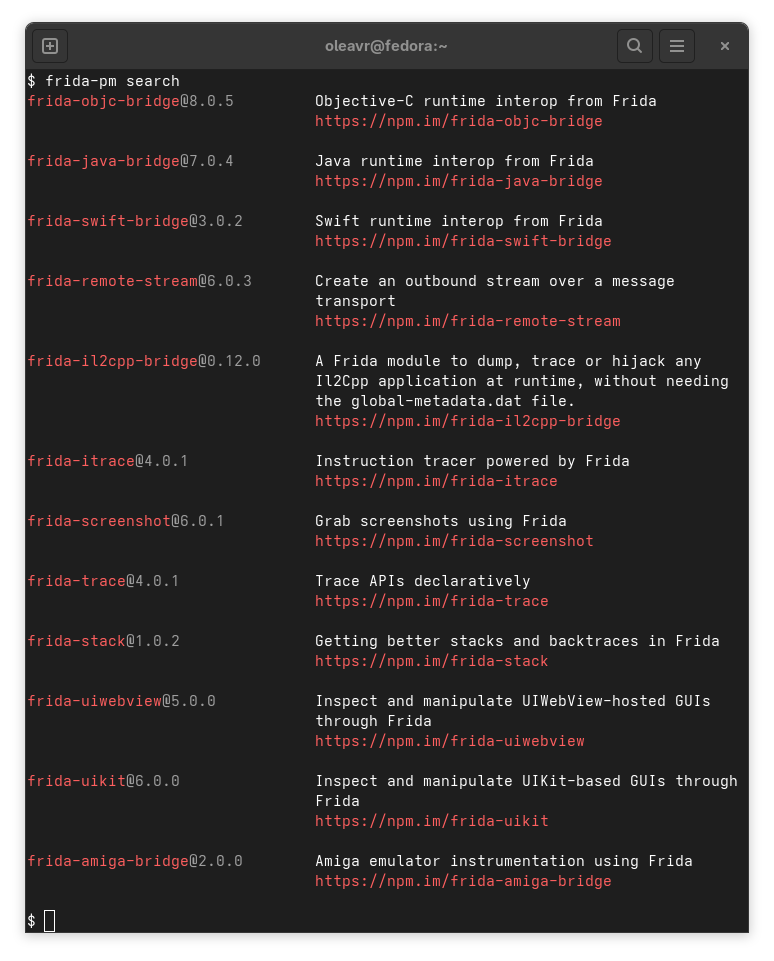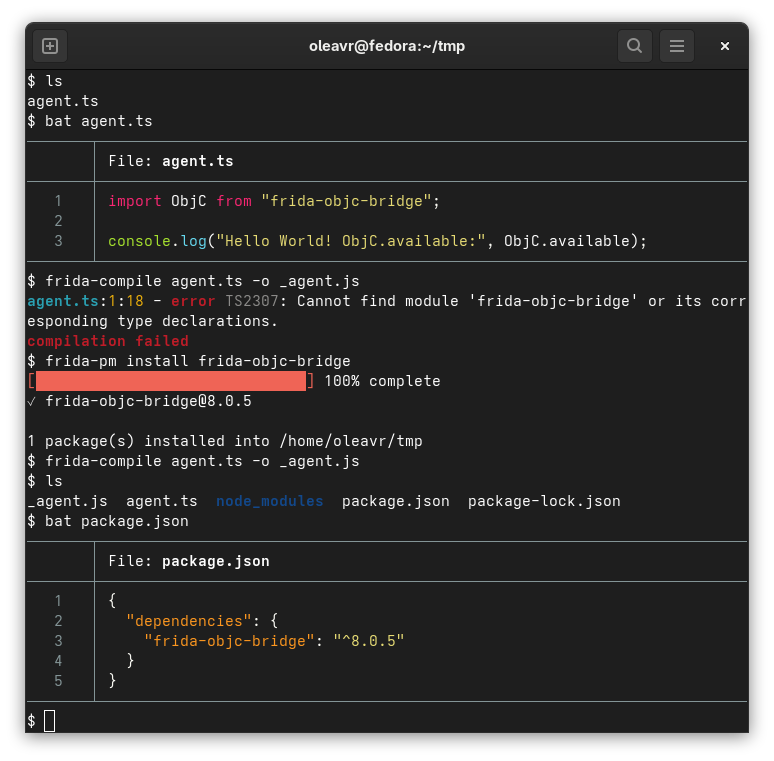Frida 17.2.0 Released ∞
release
I’m thrilled to announce the release of Frida 17.2.0. This release focuses on making package discovery dead-simple.
Here’s how easy it is to discover existing Frida-specific packages:

Consuming any of them is just as easy:

Highlights
- 🔍 frida-pm search – zero-noise results (filters by
keywords:frida-gum). - 📦 One-command install –
frida-pm install <pkg>works even without Node.js. - 🧩 Programmatic API – identical surface from Python, C, etc.
What you see here is the frida-pm CLI tool, introduced in frida-tools 14.2.0.
It’s less than 300 lines of Python code, as it’s only a thin wrapper around the
underlying Frida.PackageManager implementation.
Power users and package maintainers will still typically use npm/yarn/etc., but I feel like requiring first-time Frida users to also familiarize themselves with the larger JavaScript ecosystem is likely to overwhelm and confuse.
What’s neat about frida-pm / Frida.PackageManager is that searches only surface
Frida-specific packages. This is implemented by baking keywords:frida-gum into
the search query.
For those of you maintaining Frida-specific packages, make sure you add
frida-gum into your package.json’s keywords field. If your package is a
language/runtime bridge, also make sure you add frida-gum-bridge as well.
So discoverability is one of the key features here. Another is that it can be run on systems without Node.js + npm. While we do use npm’s registry as our default backend, you can point it at any registry you like.
You also get programmatic access to all of the functionality. For example, if you want to use the Python bindings to make a search:
import frida
pm = frida.PackageManager()
result = pm.search("il2cpp", limit=3)
print(result)
print(result.packages)You’ll see something like this:
$ python search.py
PackageSearchResult(packages=[<3 packages>], total=13)
[Package(name="frida-il2cpp-bridge", version="0.12.0", description="A Frida module to dump, trace or hijack any Il2Cpp application at runtime, without needing the global-metadata.dat file.", url="https://npm.im/frida-il2cpp-bridge"),
Package(name="frida-objc-bridge", version="8.0.5", description="Objective-C runtime interop from Frida", url="https://npm.im/frida-objc-bridge"),
Package(name="frida-java-bridge", version="7.0.4", description="Java runtime interop from Frida", url="https://npm.im/frida-java-bridge")]
$Or perhaps you’d like to install a couple of packages:
import frida
pm = frida.PackageManager()
result = pm.install(specs=["[email protected]", "frida-il2cpp-bridge"])
print(result)
print(result.packages)Which when run might look something like:
$ python install.py
PackageInstallResult(packages=[<2 packages>])
[Package(name="frida-java-bridge", version="7.0.4", description="Java runtime interop from Frida"),
Package(name="frida-il2cpp-bridge", version="0.12.0", description="A Frida module to dump, trace or hijack any Il2Cpp application at runtime, without needing the global-metadata.dat file.")]
$Installation progress is also easy to add:
import frida
def on_install_progress(phase, fraction, details):
print({
"phase": phase,
"fraction": fraction,
"details": details,
})
pm = frida.PackageManager()
pm.on("install-progress", on_install_progress)
result = pm.install(specs=["frida-java-bridge", "frida-il2cpp-bridge"])
print(result)
print(result.packages)Which might look something like:
$ python install.py
{'phase': 'initializing', 'fraction': 0.0, 'details': None}
{'phase': 'preparing-dependencies', 'fraction': 0.05, 'details': None}
{'phase': 'resolving-package',
'fraction': -1.0,
'details': 'frida-java-bridge@latest'}
…So now that we’ve looked at the PackageManager API being used from Python, I should probably mention that it is (almost) just as easy to use this API from C:
#include <frida-core.h>
int
main (int argc,
char * argv[])
{
GCancellable * cancellable = NULL;
GError * error = NULL;
frida_init ();
FridaPackageManager * manager = frida_package_manager_new ();
FridaPackageInstallOptions * opts = frida_package_install_options_new ();
frida_package_install_options_add_spec (opts, "[email protected]");
frida_package_install_options_add_spec (opts, "frida-il2cpp-bridge");
frida_package_manager_install_sync (manager, opts, cancellable, &error);
if (error != NULL)
g_printerr ("%s\n", error->message);
return (error == NULL) ? 0 : 1;
}If you want to give this example a try, grab a frida-core devkit from our releases.
You can build and run it something like this:
$ gcc install.c -o install -I. -L. -lfrida-core -Wl,--gc-sections
$ ./install(The top of frida-core-example.c has an example command-line tailored to the specific OS/arch that the devkit is for.)
Note that opts can be omitted by passing NULL, in which case the packages
defined in package.json will be installed if they aren’t already, or their
versions don’t match. And just like with npm, if you don’t have a package.json
file and simply go ahead and install some packages, a package.json will be
created for you.
This release also includes some other improvements and fixes:
- Compiler:
- Bump
@frida/netto 5.0.0. - Fix missing shim assets (thanks to @imlihe).
- Bump
- frida-node:
- Change return type of
Device.openChannel()to expose the more concrete type withdestroy().
- Change return type of
To upgrade, go ahead and run:
$ pip install --upgrade frida frida-toolsEnjoy!
 oleavr
oleavr